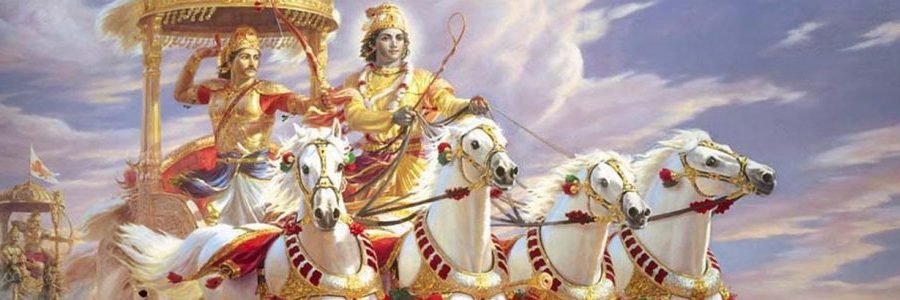The nature of humanity is steady and permanent, even after millennia. As such, we can learn lessons from our ancestors in the past, both through their virtuous deeds and their cautionary tales.
The Mahabharata, in narrating the story of the Kuru dynasty, discusses the many conflicts of vice and virtue that we as humans face on a daily basis. It is said that “what is here [in the Mahabharata] is elsewhere, but what is not here is nowhere else.”
Today, I hope to share a few lessons drawn from the Mahabharata that I have found to be especially important in this pandemic.
1) Get Smart
Being stuck indoors in self-isolation for months on end, it can be hard to see how any of us could possibly be productive. However, this is the ideal time to grow our skillset and strengthen our existing skills. There is much that can be done when alone and separated from society.
When the Pandavas spent 13 years in exile in the forest, they each set out to learn new skills, obtain new powers, and achieve various goals in that period of time. Upon Lord Krishna’s suggestion, Arjun took advantage of his exile and spent these years in penance, chanting Lord Shiva’s name. Pleased with his penance, Lord Shiva, Lord Indra, and several other devatas blessed Arjuna with divine knowledge and weaponry (including the Pashupatastra) that served him well during the Kurukshetra War.
Like Arjun, we too can take advantage of our time in isolation and gain knowledge. Be it learning a new language, starting that passion project we’ve put off for years, or even just reading new literature, this period in quarantine is extremely valuable to our growth and will serve us greatly in our future endeavors.

2) Stay Connected
It is really easy to lose touch with the people outside of your quarantine pod when everyone is dealing with the stress and challenges of this pandemic. People are fighting their own battles, and we may be too busy to reach out (or we may worry about disturbing our busy friends by reaching out). However, this is when staying connected to our network is more important than ever.
During the Pandavas’ exile, they were removed from society and spent their years focusing on building their skills. However, they maintained contact with friends (Krishna, Balaram) and allies (Drupad, Kuntibhoj) that have helped them along the path of dharma. This served to be extremely useful later on when the Pandavas needed to ask for assistance from various kingdoms in fighting the war.
By staying connected to our true friends and unconditional supporters, even during tough times, we can ensure that we will help each other and be there for each other through future struggles.
3) Family First
A lot of us are spending this quarantine with our family. Sure, family can tend to get on our nerves, but who else will be there for us through thick and thin?
Despite the many hardships and challenges the Pandavas faced, they never once failed to work together and act as a team. They had their fair share of disagreements, but they always heeded each others advice and followed the word of their eldest brother Yudhisthira. One day when the Kauravas were visiting the forest where the Pandavas were in exile, the gandharva tribe attacked the Kauravas and kept them in their captivity. Even though the Kauravas wronged the Pandavas on countless occasions, the Pandavas never once tolerated when outsiders messed with their family. The Kauravas were family, after all. Upon Yudhisthira’s request, the Pandavas fought the gandharvas and freed the Kauravas.
We might be spending our quarantine with family members that we don’t get along with, but this chance to spend so many days uninterrupted with our family is once-in-a-lifetime. We shouldn’t let this opportunity go to waste.
4) Serve Others
This pandemic has left millions of people in a state of helplessness. Lives are lost, jobs are lost, homes are lost. Now, more than ever, we must devote at least some portion of our time and energies in serving those who need help.
During their exile, Yudhisthira and Draupadi spent a part of each day washing the feet of rishis and sages, serving meals, and giving them a place to rest. Krishna advised them that by giving their time and resources in servitude to the needy, they could atone for their sins. Even Karna, as Anga Raja, donated vast amounts of wealth to the brahmanas with hopes that his sins would be wiped away.
Be it for the purpose of atoning our sins or for the pure joy in helping others, we have a calling to serve those in need in our communities.

5) Remove Distractions
In today’s world, we think of distractions to mean Facebook, Instagram, video games, TV, etc. But distractions can take place in the form of people as well. We must learn to remove the distractions and bad influences from our life, as soon as we can.
Karna grew up with all of the qualities of dharma instilled in him, and he sought to devote his life to righteousness. However, his friendship with Duryodhana and Shakuni distracted him from his values and goals, and he was led astray down a path of adharma.
It can be difficult to identify our distractions, especially if they have come to occupy a large space in our lives. But this period of quarantine is an ideal time to reflect and determine what (or who) our distractions really are. If they are changing us into someone we are not, or if they are leading us astray from our goals and values, then they are a distraction. We must remove their influence from our life and seek out those that will help us follow the right path once again.
6) Plan it Out
It’s so easy to lose our sense of direction and motivation during this pandemic. Internship plans got canceled. Companies froze hiring. Universities moved entirely online. Everything seemed to change overnight, and what we had planned out so meticulously at the beginning of this year was thrown to the wind.
The Pandavas were similarly at a great point in their lives. Yudhisthira had completed the rajasuya yajna and was crowned as the Arya Chakravarthi, or Emperor of the Aryan region. The Pandavas ruled righteously and Indraprastha prospered under their reign. But within days, everything was lost in Yudhisthira’s dice game with Shakuni, and the Pandavas were exiled to the forest for 13 years, one of which had to be spent in anonymity. Given their dire situation, they could have very easily lost their motivation to restore dharma and righteousness to their land. But with the help of Krishna, they set a plan for what they needed to achieve during their exile, as well as a master plan of how to win the war. Without planning out their strategy ahead of time, they would not have realized the success they did.
Though life has definitely knocked us down this year, we can regain our motivation and get back up on our feet again. What we need to do is plan it out.

7) Reflect on the Past
Quarantine presents us with a unique opportunity to reflect on our lives thus far and identify how we want to be going forward. We have the time to look inward and think about both the good deeds we’ve done and the mistakes we’ve made.
Yudhisthira spent a great portion of his exile reflecting on his past actions and repenting for his mistakes. He realizes that his gambling and betting caused him to bring his family into this unfortunate situation, and he reflects that even though he had good intentions (to pay respects to King Dhritarashtra), by agreeing to play the dice game, he was ultimately caught in their web of trickery. His period of self-reflection helps him recognize his mistake in repeatedly forgiving the misdeeds of the Kauravas, and he learns to be more careful in dealing with the Kauravas in the future.
We must take the time this quarantine to think about our past, both the good and the bad, and draw lessons from it. While we shouldn’t be pushed into a state of incapacitating guilt by reflecting on our mistakes, we must remember the bad in order to learn from it and move forward.
8) Embrace Solitude
This year has given us a blessing in disguise: being alone. The Buddha said, “If you want to be strong, you must enjoy being alone.” Learning to be alone, and embracing our solitude, is the secret to unlocking our inner wisdom and power.
Arjun used his 13 years in exile to harness his inner power through meditation, prayer, practice, and self-reflection. He mastered his skills in archery, he overcame his mental weaknesses, and he gained new abilities (including divine knowledge and weaponry).
In our society, teamwork and spending time in company is seen as far more valuable than solitude. However, the mental fortitude, self-direction, and empathy that you build when in solitude helps you to be a better friend, a better teammate, and a more valuable member of society. While by no means do we have to exile ourselves for 13 years like Arjun did, we should be sure to have regular moments in our schedule where we can retreat into ourselves. Let’s take the opportunity this quarantine to really embrace being alone.
9) Be Grateful
As much as this year has taken from us, we must remember to be grateful for what we do have. Adversity spares no one, but there is always someone who has it worse than us.
When Yudhisthira was lamenting the loss of his kingdom and family upon losing the dice game, the sage Brihadasva consoled him, saying that while his losses were unfortunate, King Nala and Queen Damayanti underwent even greater misfortune despite doing nothing wrong. While the Pandavas spent their exile relatively peacefully in the company of one another, Nala & Damayanti were separated from each other for all 12 years of their exile, and Nala was cursed to lose everything and everyone he had. Only after 12 long years of hardships were Nala and Damayanti finally reunited and prosperous again. Upon hearing their story, Yudhisthira was grateful for what he had with him, namely the company of his family and the support of his friends.
Being in lockdown, we have come to realize and appreciate our good health and fortune. This pandemic has taught us the value of healthcare staff, government officials, essential workers, and every other person who is working day in and day out to keep us safe. To them all, we are eternally grateful.

